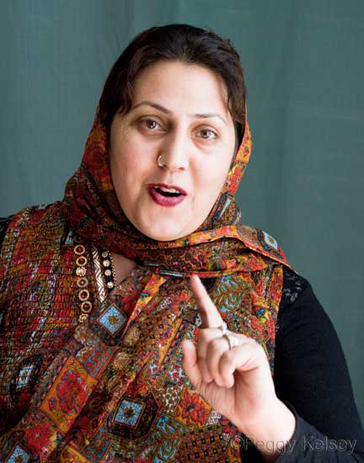
Najia
(Read the original post about Najia.)
Helping the women of Afghanistan by helping them have their own income will reduce a lot of violence, especially violence in the family, but also violence overall. In the Shamali area, (Just north of Kabul) there is a lot of food, a lot of apples, a lot of fresh and very good fruit and they can make jam or pickles from these. They already have all of the raw materials and they can make things to sell. They can also grow trees from seeds which they can sell after one year. But someone needs to organize the selling part of this. It is something I’d like to do in the future. Read More
About Najia
I was born into a middle class family, the youngest of 4 girls. My father died when I was 4. Despite delays from fighting during the Mujahidin period, I graduated from high school and then studied nursing in Jalalabad. During the Taliban era, I was able to work with my sister who was a doctor and I spent part of that time in the village of Allengar in Nuristan as a midwife, and later in Kabul as a pharmacist. After the Taliban left, I began to work as an administrative assistant to the director of World in Need. That was when you (Peggy) and I first met in 2003. At that time, I was engaged and now I am married and I have two children. The oldest is five years old and the youngest one is six months. I had been living with my in-laws for four years and there were a lot of problems. I began to think that I should separate from my husband, but if I did that I’d have to give my sons to him. (The law says that the sons stay with their mother until they are five years old and the daughters till they are seven. Then the kids are handed over to the father’s family to raise.) So I said okay, let me find another solution. I called a meeting with my husband’s family and we sat together and we decided to live separately from my in-laws. Now it’s going okay.
Now I’m working for USAID and I teach the procurement law to the staff of the ministries. We train the trainers who are going to all the provinces of Afghanistan. This is a new thing because before there was no law, there was just a manual.
Does this procurement law really work to protect against corruption?
Maybe it works 50 percent. But you know corruption. If they want to do corruption they will but this makes it a little bit less.
Also, I am starting my own business. I have my chips factory that’s going to start up this Saturday. I got a chance to study business at American University with the 10,000 women program. So I started there. This course was very helpful and I learned how to make a business plan and how to do the marketing.
My husband does the marketing for my business. You know, it’s not easy for a woman to do business or to go and talk with people outside. I personally don’t need my husband to do this but these shopkeepers are very lowly educated and they don’t think that a woman should have a business or have a factory. So that’s why I hired my husband. Also, I cannot trust anybody else. Of course I’m doing the financial things and all the accounting but I need someone to take care of distributing and marketing.
Please talk about how you resolved the problem with your in-laws.
Really, if I didn’t have any income they wouldn’t listen to me. So I told them that I not am a woman who will follow what my husband says or what my family says. I will just listen to them. I know what my rights are under Islam and I understand my rights under the law in Afghanistan. But the main thing is that I have an income, that’s why they respect me and why they listen to me. They know I am working at a high level. If I was uneducated nobody would listen to me. And you know there are many uneducated women in Afghanistan and they cannot solve their family problems because nobody will listen to them and they’re not strong enough to talk about them.
Your character is very strong, starting with confronting those people who were trying to steal your house and then starting your own business. What do you think made you so strong?
I learned this from my situation and from society because my mother, sisters and I were always living alone. My father died when I was four and I don’t have any uncles or brothers. We didn’t have any problem. Because I was the youngest child I was the one who had to get things from the bazaar because my sisters were older and if they went out of the house the people would think they were not good. So I was the one who had to deal with the shopkeepers. Through that, I learned how to be very strong. I always had to fight for my rights.
« back to Portraits & Stories list